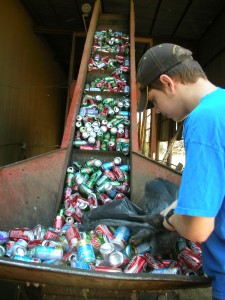 Next to paper, bottles and cans are the most commonly recycled materials in the United States. This category represents all glass, plastic and metal/aluminum containers. Recycling these items:
Next to paper, bottles and cans are the most commonly recycled materials in the United States. This category represents all glass, plastic and metal/aluminum containers. Recycling these items:
- Saves natural resources from being mined and harvested
- Reduces the pollution created when extracting, processing, and shipping the raw materials
- Can save your business money on disposal costs
- Is one of the most common requests by employees for improved environmental performance at the work place
Why should you recycle bottles and cans?
Currently, all glass, plastic and metal/aluminum bottles and cans are banned from disposal in the state as part of the Massachusetts Waste Bans. This includes all beverage and food containers, and other non-toxic product containers such as detergent bottles, shampoo, aerosol cans, etc. Nearly all of these containers are made of extremely valuable and highly recyclable materials.
To help businesses comply with Massachusetts Department of Environmental Protection (Mass DEP) Waste Bans for bottles, cans, and other materials, RecyclingWorks developed the following sector-specific tip sheets, available in both English and Spanish. Tip sheets for additional business sectors will be posted below as they are available. If you are interested in having any of these materials translated into another language, please contact RecyclingWorks at (888) 254-5525 or info@recyclingworksma.com.
![]() Waste Ban Compliance Tips for Restaurants [English] [Español]
Waste Ban Compliance Tips for Restaurants [English] [Español]
Waste Ban Compliance Tips for Colleges & Universities [English] [Español]
Waste Ban Compliance Tips for Property Managers [English] [Español]
Massachusetts has a bottle and can deposit law, Bottle Bill, for carbonated beverages, mineral water, and beer containers, which has lead to a high recycling rate for these select beverages and provides an added incentive to collect these containers. Recycling and hauling services for bottles and cans are widely available in Massachusetts. We recommend that you check with your recycling hauler on the breadth of containers they accept before starting your program.
How are bottles and cans recycled?
In Massachusetts, most residential and commercial bottle and can recycling happens at a Materials Recovery Facility (MRF). When your recycling container is picked up by your hauler, it is brought back to a MRF for sorting. Trucks dump the materials out on the tipping floor and the items are moved on a system of conveyor belts and sorters to group like items. These separated items are then baled and sent to recyclers that further process these materials either domestically or abroad.
What happens after bottles and cans are recycled?
Recycled bottles and cans wind up becoming a wide variety of new products:
- Aluminum cans are recycled into new aluminum cans, rain gutters, or window frames.
- Steel cans become new steel cans, recycled bicycles, or steel beams.
- Glass jars and bottles are recycled into new jars and bottles.
- Plastic bottles can be recycled into polyester fleece or carpeting, some beverage manufacturers are using small amounts of recycled plastic in their containers.
Learn about recycling other materials
For more information on other commonly recycled materials visit these pages:
- Cardboard
- Construction Materials
- Electronics
- Fluorescent Lamps/Light Bulbs
- Food Waste
- Mattresses
- Pallets
- Paper
- Plastics
- Single Stream
- Textiles
Additional Resources:
- For a directory of available on-site technologies for depackaging food and liquid waste, see our food depackaging technologies guide.
- Find out how to start or improve your own recycling program.
- Find a hauler or processor for recyclable materials in your area, search our Recycler Database.
- Find out how you can purchase recycled products, check out our Buying Recycled Products section.
- Learn about Massachusetts Waste Bans
